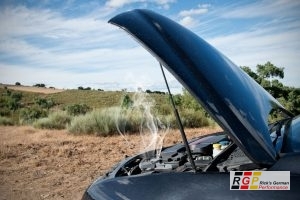
Engine Trouble? See if These Symptoms Ring a Bell.
Having problems with engine overheating? It’s a little more common that you realize. What’s worse, there are numerous potential causes for overheating that can leave you confused and frustrated. To help you get a grasp of what’s going on with your engine, here are some useful tips on understanding the problem and fixing it.
Engine Overheating Causes
There are some many reasons for an engine to start overheating, but the majority can be narrowed down into two common categories: low fluids and part failure. When it comes to fluids, two essential components of your car system are coolant and oil. Oil allows your key parts of your engine to generate power without creating excessive friction and additional heat. Coolant absorbs heat throughout your engine and safely expels it without harming performance. Thinks can get hot really quickly when either of these fluids is too low.
While fluid problems tend to cause a gradual buildup of heat, part failure is more likely to cause sudden engine overheating headaches. As our friends at Car Throttle previously pointed out, two frequent causes of overheating include faulty thermostats and radiator woes. Your engine thermostat serves as a mediator between your engine and the radiator, activating a steady flow of coolant when the engine starts to heat up. If this thermostat shorts out, your radiator won’t activate the coolant circulation. Basically, your engine would be in serious trouble. Many car owners also have problems with their radiator. A loose part or a leaky hose can cause coolant to gradually spill out of your vehicle. This will lead to reduced performance and (eventually) engine power loss.
How Long Does it Take for a Car to Cool Down?
When you’re stuck on the side of the road in the summer heat, you’ll probably feel tempted to drive away after just a few minutes. Stop right there! If you try driving away without giving your car a chance to cool down, you could end up seriously damaging your engine and aggravating a bad situation. According to a recent article by Esurance, who also has several helpful tips on roadside emergencies, “It typically takes a solid 30 minutes for an engine to cool down enough for it to be safe to handle.” If necessary, take a moment to top off your coolant.
Your Auto Repair Specialists
Worried about your vehicle? If you’re having problems with your engine overheating, feel free to talk with one of our experts at German Performance. You can contact us at (805) 466-3236 or bring your vehicle in for a tune-up. Stay safe!
